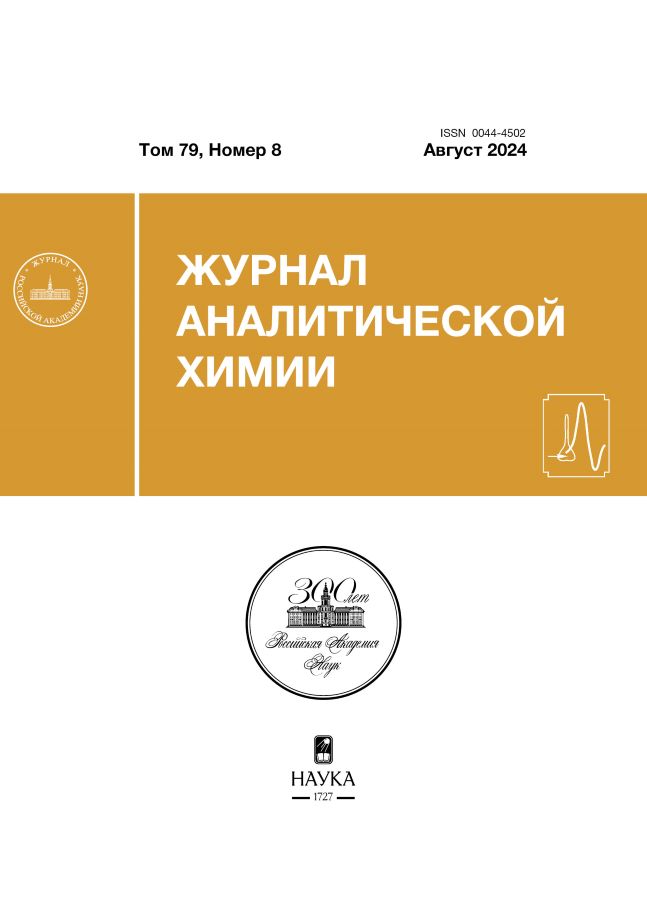Gas chromatographic analysis of γ-hexachlorocyclohexane distribution in agricultural crops
- 作者: Musabirov D.E.1,2, Daukaev R.A.1, Karimov D.O.1, Guskov V.Y.2
-
隶属关系:
- Ufa Research Institute of Occupational Medicine and Human Ecology
- Ufa University of Science and Technology
- 期: 卷 79, 编号 8 (2024)
- 页面: 863-869
- 栏目: ORIGINAL ARTICLES
- ##submission.dateSubmitted##: 03.06.2025
- URL: https://rjmseer.com/0044-4502/article/view/682319
- DOI: https://doi.org/10.31857/S0044450224080065
- EDN: https://elibrary.ru/tjgqro
- ID: 682319
如何引用文章
详细
The study focuses on investigating the distribution of γ-hexachlorocyclohexane in turnip and beetroot among their fruits, stems, and peels. The sample preparation method, recommended by GOST, is supplemented by using liquid nitrogen for more thorough grinding and cell disruption of plants. It has been found that the application of liquid nitrogen, while keeping other experimental parameters constant, leads to a 2-3-fold increase in the detectable amount of pesticide. It was established that the distribution of γ-HCH in plants is uneven: the highest concentration of the pesticide was found in the peel, while the stems showed the lowest γ-HCH content. It is shown that γ-HCH accumulates better in the peel of beetroot compared to turnip peel, with the opposite pattern observed for the stems. The accumulation of γ-HCH in the fruits of these root vegetables is similar in magnitude. The obtained data can be valuable for analytical quality control services of agricultural products.
全文:
作者简介
D. Musabirov
Ufa Research Institute of Occupational Medicine and Human Ecology; Ufa University of Science and Technology
编辑信件的主要联系方式.
Email: 30102000@rambler.ru
俄罗斯联邦, Ufa; Ufa
R. Daukaev
Ufa Research Institute of Occupational Medicine and Human Ecology
Email: 30102000@rambler.ru
俄罗斯联邦, Ufa
D. Karimov
Ufa Research Institute of Occupational Medicine and Human Ecology
Email: 30102000@rambler.ru
俄罗斯联邦, Ufa
V. Guskov
Ufa University of Science and Technology
Email: 30102000@rambler.ru
俄罗斯联邦, Ufa
参考
- Kaur R., Mavi G.K., Raghav S., Khan, I. Pesticides classification and its impact on environment // Int. J. Curr. Microbiol. Appl. Sci. 2019. V. 8. № 3. P. 1889. https://doi.org/10.20546/ijcmas.2019.803.224
- Gong P., Xu H., Wang C., Chen Y., Guo L., Wang X. Persistent organic pollutant cycling in forests // Nat. Rev. Earth Environ. 2021. V. 2. № 3. P. 182. https://doi.org/10.1038/s43017-020-00137-5
- Walker K., Vallero D.A., Lewis R.G. Factors influencing the distribution of lindane and other hexachlorocyclohexanes in the environment // Environ. Sci. Technol. 1999. V. 33. № 24. P. 4373.
- Wondimu K.T., Geletu A.K. Residue analysis of selected organophosphorus and organochlorine pesticides in commercial tomato fruits by gas chromatography mass spectrometry // Heliyon. 2023. V. 9. № 3. Article e14121. https://doi.org/10.1016/j.heliyon.2023.e14121
- Zuo W., Lin Q., Liu X., Lv L., Zhang C., Wu S., et al. Spatio-temporal distribution of organochlorine pesticides in agricultural soils of southeast China during 2014-2019 // Environ Res. 2023. V. 232. Article 116274. https://doi.org/10.1016/j.envres.2023.116274
- Adeleye A.O., Sosan M.B., Oyekunle J.A.O. Dietary exposure assessment of organochlorine pesticides in two commonly grown leafy vegetables in South-western Nigeria // Heliyon. 2019. V. 5. № 6. Article e01895. https://doi.org/10.1016/j.heliyon.2019.e01895
- Abhilash P.C., Jamil S., Singh V., Singh A., Singh N., Srivastava S.C. Occurrence and distribution of hexachlorocyclohexane isomers in vegetation samples from a contaminated area // Chemosphere. 2008. V. 72. № 1. P. 79. https://doi.org/10.1016/j.chemosphere.2008.01.056
- Mackay D., Shiu W.Y., Ma K.C. Illustrated handbook of physical-chemical properties of environmental fate for organic chemicals // CRC Press. 2006. P. 4216. https://doi.org/10.1201/9781420044393
- Mattina M.J., Iannucci-Berger W., Dykas L., Pardus J. Impact of long-term weathering, mobility, and land use on chlordane residues in soil // Environ. Sci. Technol. 1999. V. 33. № 14. P. 2425.
- Willett K.L., Ulrich E.M., Hites R.A. Differential toxicity and environmental fates of hexachlorocyclohexane isomers // Environ. Sci. Technol. 1998. V. 32. № 15. P. 2197. https://doi.org/10.1021/es9708530
- Afful S., Anim A.K., Serfor-Armah Y. Spectrum of organochlorine pesticide residues in fish samples from the Densu Basin // Res. J. Environ. Earth. Sci. 2010. V. 2. № 3. P. 133.
- Ododo M.M., Wabalo B.K. Polychlorinated biphenyls (PCBs) and their impacts on human health: A review // J. Environ. Pollut. Hum. Health. 2019. V. 7. № 2. P. 73.
- Gonzalez M., Miglioranza K.S., Aizpún de Moreno J.E., Moreno V.J. Occurrence and distribution of organochlorine pesticides (OCPs) in tomato (Lycopersicon esculentum) crops from organic production // J. Agric. Food Chem. 2003. V. 51. № 5. P. 1353. https://doi.org/10.1021/jf025892w
- Zhang A., Luo W., Sun J., Xiao H., Liu W. Distribution and uptake pathways of organochlorine pesticides in greenhouse and conventional vegetables // Sci. Total. Environ. 2015. V. 505. P. 1142. https://doi.org/10.1016/j.scitotenv.2014.11.023
- Mikes O., Cupr P., Trapp S., Klanova J. Uptake of polychlorinated biphenyls and organochlorine pesticides from soil and air into radishes (Raphanus sativus) // Environ. Pollut. 2009. V. 157. № 2. P. 488. https://doi.org/10.1016/j.envpol.2008.09.007
- Simonich S.L., Hites R.A. Organic pollutant accumulation in vegetation // Environ. Sci. Technol. 1995. V. 29. № 12. P. 2905. https://doi.org/10.1016/j.scitotenv.2014.11.023
- ГОСТ 30349-96. Методы определения остаточных количеств хлорорганических пестицидов. М.: Стандартинформ, 2008. C. 12.
- ГОСТ ISO 14507-2015. Качество почвы. Предварительная подготовка проб для определения органических загрязняющих веществ. М.: Стандартинформ, 2019. C. 16.
- Albero B., Tadeo J.L., Pérez R.A. Ultrasound-assisted extraction of organic contaminants // Trends Anal. Chem. 2019. V. 118. P. 739. https://doi.org/10.1016/j.trac.2019.07.007
- Sajid M., Woźniak M.K., Płotka-Wasylka J. Ultrasound-assisted solvent extraction of porous membrane packed solid samples: A new approach for extraction of target analytes from solid samples // Microchem. J. 2019. V. 144. P. 117. https://doi.org/10.1016/j.microc.2018.08.059
补充文件











